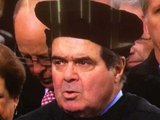Friday Roundup

From the Department of Silly Walks. That's Antonin Scalia, no less, sporting the chapeau that allowed him to win the Grand Prize for Goofiest Hat at the Edgerton, MN, county fair last summer. Actually, it's the headgear he chose to wear at the presidential inauguration last week. The hat was a replica of that worn in the famous portrait of Thomas More, who served as Chancellor of England and was condemned to death for refusing to recognize King Henry VIII's divorce from Catherine of Aragon. More's last words were, "I am the king's good servant, but God's first," and Scalia's choice of this particular headgear led to all manner of speculation as to whether he was making a political statement rather than a fashion one. As one scribe put it,
Wearing the cap of a statesman who defended liberty of church and integrity of Christian conscience to the inauguration of a president whose policies have imperiled both: Make of it what you will.
Well, yeah, but then again, maybe sometimes a goofy hat is just a goofy hat.
Onward with the arts. Scalia's major accomplishment, of course, is the acceptance of originalism as a desired means of constitutional interpretation. Perhaps the desired means: in DC v. Heller, the arguments of both the majority and the dissent focused on what the Framers meant when they adopted the 2nd Amendment, rather than what that might have to do in a time which allows individuals to use weapons with destructive capabilities that couldn't have been imagined in 1790. The way things might turn out, in the near future Scalia and his doctrinal brethren might have to try to grapple with whether the Framers would have intended the 1st Amendment to cover the right of porn producers not to have the performers wear condoms.
Lost in the hullabaloo over the election of a president, 34 senators, and 435 congresscritters last November was passage of Measure B in Los Angeles. Pushed by the AIDS Healthcare Foundation, it requires that anyone producing a porn movie in Los Angeles -- and L.A. is the porn capital of the world, employing about 10,000 people there -- has to ensure that male performers wear condoms during the filmed sex acts.
The law is idiotic, of course. It's not so much Big Brother, as Creepy Little Brother: you mean we're going to pay tax dollars to have public employees drop in on porn sets and watch sex scenes? Maybe have a special unit, called the Prophylactic Police?
Of course, arguing the validity of the law gets you only so far in court, since you're wandering around in the Rational Basis desert. You need to bring a constitutional right into the mix, which will get you into Strict Scrutiny Land. And lo and behold, here comes the 1st Amendment, ready to do our bidding. The theory is something like "forced expression," that is, that you're being forced to produce porn movies with the actors wearing condoms, and that this is thus a content-based restriction that's prohibited by the 1st Amendment. Or something like that. This guy has a long article explaining the intricacies of the argument, and I actually managed to get through the whole thing without giggling.
Small town, U.S.A. At the risk of making it seem like Beavis and Butthead co-authored today's post, I'll note that yet another sex case brings up constitutional issues. Seems that Kennebunk, Maine, has taken up the unlikely role of the Soddom and Gomorrha of the frozen Northeast. According to authorities, Alexis Wright was actually using her Zumba Dance Studio as a front for prostitution, with the help of Mark Strong. This earned the two indictments on a combined 165 counts. Forty-six of them related to Strong videotaping Wright having sex with the customers, without the customers' knowledge, under a criminal statute prohibiting invasion of privacy.
Now, if your first thought upon reading that last sentence was, "who has a reasonable expectation of privacy in paying to have sex in a dance studio?" you too can be a judge, because that's what the judge in Strong and Wright's case thought about. It's more complicated than that, of course, as you know from 4th Amendment law: the issue is whether the person has a subjective expectation of privacy which the public views as objectively reasonable. But not too complicated; the judge decided that whatever expectation the johns had, society wasn't willing to regard that as reasonable, and tossed those counts.
Comments